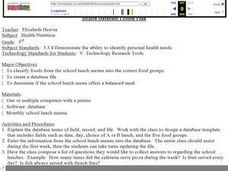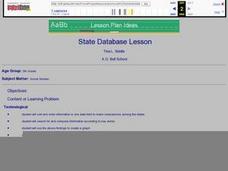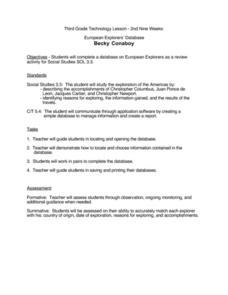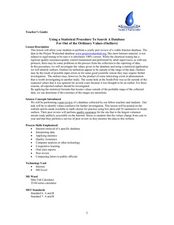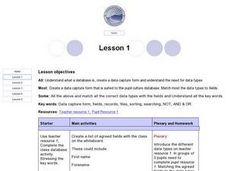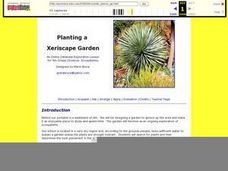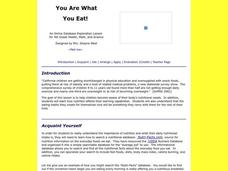Curated OER
Health Database Lesson Plan
Third graders demonstrate the ability to identify personal health needs. They classify foods from the school lunch menus into the correct food groups. A database file is created. They determine if the school lunch menu offers a balanced...
Curated OER
State Database Lesson
Fifth graders create a database about the geography of the United States. The access to a computer is essential for this lesson. The outcome is that technology is used as a tool to measure student understanding of geographical locations....
Curated OER
European Explorers Database
Third graders watch a demonstration on how to create a new database. In pairs, they enter information about European explorers in an easy to read fashion. They save and print their databases to be used in a review game before their test.
Curated OER
Dinosaur Database
Third graders practice using a database to find information related to dinosaurs. Using the data, they make informational cards to use while developing a timeline that shows when dinosaurs roamed the Earth. They answer comprehension...
Curated OER
States Database Searching and Sorting
Fifth graders search and sort prepared databases for information to use in classroom projects, locate, gather, evaluate, organize, and analyze information.
Teach Engineering
Storing Android Accelerometer Data: App Design
There's an app for that! Pupils learn to build an app that will store data on an Android. The instructional activity introduces class members to the tiny database, TinyDB, for Android devices. A video tutorial provides an example that...
Curated OER
Database Lesson Plan
Students add themselves in to a story. In this literature lesson, students listen to the story Miss Nelson is Missing by Harry Allard and James Marshall. They pull out certain words in the story and add their own to create a new version.
Curated OER
European Elevation Sort
Given a prepared database of European countries, sixth graders sort the countries in ascending order by elevation and identify the five countries with the highest elevations. This cross-curricular lesson combines elements of computer...
Curated OER
Metrically Me!
Young scholars define the parts of a database, search strategies to locate information electronically, create/modify databases, etc. and enter data into a prepared spreadsheet to perform calculations.
Curated OER
Database Scavenger Hunt
Students create a database to show information about events in history. In this database lesson, students create and analyze information on the slave trade. Students answer questions based on the information collected.
Curated OER
Designing Databases
Students explore the basic concepts of a relational database by designing a questionnaire to gather information about their school's student body for use in designing more effective school programs.
Curated OER
Land or Sea?
Sixth graders access a database to search for desired information, using "and" or "or" connectors where necessary. They choose a connector and search a prepared database of European countries to locate which countries border certain...
Curated OER
California Missions
Fourth graders use what they already have gathered on California missions to create a database. Using the different missions, they brainstorm, organize and categorize what they have gathered. They present their material to the class and...
Curated OER
Using a Statistical Procedure To Search A Database For Out of the Ordinary Values
Young scholars develop a spreadsheet containing formulas and find summaries for them. In this investigative lesson students choose a topic, investigate it and use MS Excel to sort data.
Curated OER
Advanced Information Systems Database Access
Learners investigate the usage of databases. They design and create their own databases to hold information. They edit the file and sort/ index the new database. They also generate a detailed report of the data present.
Curated OER
Database
Second graders collect daily weather information and introduce them to databases.
Curated OER
The 50 States
Fifth graders use a database to gather information on the United States. Using this information, they try to describe the settlement patterns in the various states. They enter additional information into the database and use queries to...
Curated OER
Finding Your Way in the World Wide Web
Researchers practice grouping items to explore the concept of a database. They apply these concepts to the WWW search engine format and consider why it is important to enter the most specific information.
Curated OER
Technology Integration
Third graders describe and locate the five geographical regions of the state of Virginia. Using that information, they organize the descriptions in a database they created. They are graded based on accuracy and spelling all noted on a...
Curated OER
Exploring National Flags
Sixth graders examine the importance of flags throughout the world. Examining different countries, they determine the geographical and historical contributions in the past and modern times. They compare and contrast the flags of five...
Curated OER
How Are Plants Similar And Different?
Studetns create an index card database of different categories of plants such as bushes, trees, flowers, grasses and vegetables. They review the different parts of a plant and label pictures of plants on the database cards. They use the...
Curated OER
Planting a Xeriscape Garden
Fourth graders use a plant database to discover new vocabulary associated with plants and ecosystems. Using a pile of dirt behind their school, they design a garden to make it a more enjoyable place. They print out the types of plants...
Curated OER
Food Chain
Fourth graders use a database on animal diversity to complete the lesson. Using the information, they discover how organisms are linked to one another by their dependence on each other for food. In groups, they develop their own food...
Curated OER
You Are What You Eat!
Fourth graders discover the nutritional needs of their bodies. Using a database, they research how nutrition affects their learning capabilities. They take the food they eat on a daily basis and discover its nutritional value. They...


